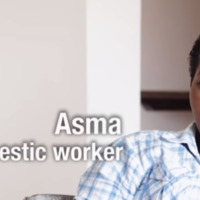
Lakshmi
There are an estimated 4,000 people living in modern slavery in Qatar (GSI 2018). Qatar is a destination country for men and women subjected to forced labour and, to a much lesser extent, forced prostitution. Men and women from Nepal, India, Pakistan, Bangladesh, the Philippines, Indonesia, Sri Lanka, Sudan, Kenya, Nigeria, Uganda, and other countries voluntarily migrate to Qatar as unskilled laborers and domestic workers, often paying illegal and exorbitant fees to unscrupulous recruiters in the labour-sending countries, thereby increasing their vulnerability to debt bondage. Some workers subsequently face conditions indicative of involuntary servitude, to include restricted movement, payment withholding, passport confiscation, exit permit retention, and threats of deportation or abuse. Individuals in Qatar sell visas to migrants and occasionally demand regular payments, enabling migrant workers to work illegally and without legal recourse against their respective sponsors, although reportedly this trend is on the decline. Lakshmi was trafficked from India to Qatar into domestic servitude, the age of 24. She was sexually abused and beaten by her employers who took away her documents. When she asked to go back to India she was told she would have to pay. The harassment continued until her case was taken up by the Indian embassy in Qatar.

Rahat
There are an estimated 1.22 million people living in conditions of modern slavery in Indonesia (GSI 2018). Traffickers exploit both domestic and foreign victims in Indonesia. Government regulations allow employers in certain sections, including small and medium enterprises and labour-intensive industries, an exemption from minimum wage requirement, thus increasing risks of exploitation. Traffickers exploit many Indonesians through force and debt-coercion. Men, women and children are exploited in fishing, construction, on plantations, in mining and in manufacturing industries. Vessel crew on board Chinese, Korean, Vanuatuan, Taiwan, Thai, Malaysian and Philippines-flagged and/or owned fishing vessels operating in Indonesian waters subject fisherman to forced labour. Recruitment agencies lure people with promises of high wages, charge fees, assign them fake identities and labor permit documents and send them to fish long hours in waters on vessels operating under complex multinational flagging and ownership arrangements. Crews on board fishing vessels have reported low or unpaid salaries and coercive tactics such as contract discrepancies, document retention, restricted communication, poor living and working conditions, threats of violence and physical and sexual abused. Rahat was looking for work when he was encouraged by a friend to travel to Bangkok for work. He was told he would be able to make more money at sea than on land, however instead he was trafficked on to a fishing trawler in Indonesia. Conditions on the boat were awful, there was not enough food to last the crew and they were subjected to beating if they were ‘lazy.’

Asma A.
There are an estimated 9000 people living in conditions of modern slavery in Oman (GSI 2018). It is is a transit and destination country for men and women primarily from India, Pakistan, Bangladesh and the Philippines, most of whom migrate willingly as domestic servants or low-skilled workers in the country’s construction, agriculture and service sectors. Trafficked persons subsequently experience conditions of modern slavery such as the confiscation of passports, restrictions on movement, non-payment of wages, long working hours without rest and physical or sexual abuse. Asma left her infant daughter in Tanzania in 2015 to work in Oman as a domestic worker. However, she found that her employers paid her far less than she expected and she was subjected to sexual abuse.

Taylor
There are an estimated 403,000 people living in modern slavery in the United States (GSI 2018). Sex trafficking exists throughout the country. Traffickers use violence, threats, lies, debt bondage and other forms of coercion to compel adults and children to engage in commercial sex acts against their will. The situations that sex trafficking victims face vary, many victims become romantically involved with someone who then forces them into prostitution. Others are lured with false promises of a job, and some are forced to sell sex by members of their own families. Victims of sex trafficking include both foreign nationals and US citizens, with women making up the majority of those trafficked for the purposes of commercial sexual exploitation. In 2015, the most reported venues/industries for sex trafficking included commercial-front brothels, hotel/motel-based trafficking, online advertisements with unknown locations, residential brothels, and street-based sex trafficking. Taylor was trafficked out of Florida by a family friend when she was 16 years old. Taylor was subjected to sexual abuse and trafficked around the country, forced to provide sexual services. She was finally able to escape and went to her mother who called the police. Taylor was in FBI witness protection while her trafficker was being prosecuted. She is now 18 years old and her trafficker has been sentenced to 30 years in federal prison followed by lifetime supervised release.

Basma N.
The Global Slavery Index has estimated that there are almost 3 million people living in conditions of modern slavery in the region of the Middle East and North Africa. Oman is a transit and destination country for men and women primarily from India, Pakistan, Bangladesh and the Philippines, most of whom migrate willingly as domestic servants or low-skilled workers in the country’s construction, agriculture and service sectors. Trafficked persons subsequently experience conditions of modern slavery such as the confiscation of passports, restrictions on movement, non-payment of wages, long working hours without rest and physical or sexual abuse. Basma N., 21, from Majohe in Dar es Salaam, went to Oman in March 2015 after her agent in Tanzania promised her a domestic worker job for a family of four with a salary of 70 OMR ($182) a month. However, upon arrival her employer confiscated her passport, and forced her to work 21 to 23 hours a day with no rest and no day off, in three houses for a family of nine, for 60 OMR ($156) per month. Basma was confined to the house, verbally abused and had two months’ salary taken away after she complained to the embassy about her working conditions. Her employer refused to let her leave unless she paid back costs amounting to 2,400 OMR ($6,234).